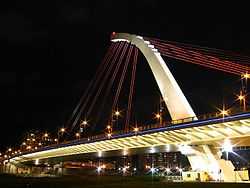Zhongshan District, Taipei
- Chungshan and Chung-shan redirect here. See Zhongshan (disambiguation) for other meanings.
| Zhongshan District 中山區 Niou-Pu(牛埔) (old name) | |
|---|---|
 | |
 | |
| Country | Taiwan |
| Region | Western Taipei |
| Divisions |
List
|
| Area | |
| • Total | 13.68 km2 (5.28 sq mi) |
| Area rank | Ranked 6th of 12 |
| Population | |
| • Total | 218,397 |
| • Rank | Ranked 7th of 12 |
| • Density | 16,000/km2 (41,000/sq mi) |
| Postal code | 104 |

Zhongshan District (Chinese: 中山區; Tongyong Pinyin: Jhongshan Cyu; Hanyu Pinyin: Zhōngshān Qū; Wade–Giles: Chung1-shan1 Ch'ü1; Pe̍h-ōe-jī: Tiong-san-khu) is an administrative district of Taipei City, named after Sun Yat-sen, better known in Chinese as "Sun Zhongshan".
Economy
In the 1970s, the district was recognised as the centre of the city's tourist industry with large hotels and international restaurants. The interest from tourists allowed the district to develop as a centre of international business.[1]
In recent decades, the district's economy and its population have both contracted, due in part to the decentralisation of industrial and manufacturing activities. Parts of Taipei's "financial core" (that once centred on the Zhongshan District) have been moved to other districts.[2]
Between 1991 and 1996, the district lost 2,600 jobs while the rest of Taipei experienced increased jobs growth (120,000 jobs in the same period). Between 1991 and 1999, the district's population decreased by more than 21,000, accounting for 27.6% of Taipei's total population decrease during that period.[2] According to some economists, the decrease in population and jobs allowed an informal sex industry to thrive in the district leading to an increased crime rate.[2]
Tatung Company[3] and Uni Air[4] have their headquarters in the district.
Recreation
The district features many recreational areas which include Rongxing Garden, Xinsheng Park, Zhongshan Fine Arts Park, Dajia Riverside Park, Taipei Municipal Children's Recreation Area, Suho Paper Memorial Museum and Museum of Jade Art.
The National Revolutionary Martyrs' Shrine is located in the district, dedicated to those who died trying to turn China into a republic.[5] The district also has a Fine Arts Museum.
Another major tourist attraction is the Xingtian (Singtian) Temple, which is dedicated to Guan Gong, the God of War. Nearby the Yuanshan Metro Station is the Zhongshan Soccer Stadium, which was built on land that used to be the headquarters of the US military presence on Taiwan when the US still had diplomatic ties with the Republic of China. Not surprisingly, Zhongshan has a large pub and bar district and the Zhongshan Metro Mall.
Education
The northernmost part of Zhongshan District is known as Dazhi. The former ROC President Chiang Ching-kuo lived here at the Seven Seas Residence. In this region, there is also the Dominican International School, which is a private English-language Catholic school serving kindergarten to high school.
Taipei's equivalent to "Little Manila" lies in the Zhongshan District in the region near St. Christopher's (Catholic) Church. Every Sunday, many Filipino domestic workers and laborers attend mass at the church and relax around the surrounding Filipino grocery stores and eateries.
The Zhongshan District is also home to a number of wedding photo shops particularly along the 2nd and 3rd sections of Zhongshan North Road. Access to this district by transit is very convenient with 6 Taipei Metro stations (2 on the Wenshan Line and 4 on the Tamsui Line). Also a number of new stations are under construction as part of Phase 2 of the Taipei Metro expansion plan. Like the rest of Taipei City, Zhongshan District is serviced by an extensive public bus system that supplements the Taipei Metro. Also, numerous private bus companies operate buses into this district to other parts of Taiwan such as Taoyuan County and Kaohsiung.
Transportation
On a historical note, Zhongshan North Road, which crosses the district was often used by Chiang Kai-Shek to get to his home in Shilin. All traffic was stopped when this occurred as everybody had to salute the leader. Military police during martial law often lined the street as this road was used by numerous political and military leaders, some of which stayed at the Grand Hotel in Yuanshan.
Zhongshan Road, along with Zhongxiao Road (which runs west to east), denote the compass directions of roads in Taipei City. For instance, when Zhongshan South Rd intersects with Zhongxiao Road, it becomes Zhongshan North Road. Similarly, When Zhongxiao West Road intersects with Zhongshan Road, it becomes Zhongxiao East Road. This methodology can be applied for most roads in Taipei City.
Zhongshan District is served by many stations of the Taipei Metro.
References
- ↑ The globalization of Chinese food by David Yen Ho Wu & Sidney C. H. Cheung (University of Hawaii Press, 2002)
- ↑ 2.0 2.1 2.2 Globalizing Taipei: The Political Economy Of Spatial Development by R. Yin-wang Kwok (Routledge, 2005)
- ↑ "Contact Us." Tatung Company. Retrieved on March 15, 2010.
- ↑ "關於立榮航空." Uni Air. January 3, 2008. Retrieved on March 15, 2010.
- ↑ Taipei Sights: A Travel Guide to the Main Attractions in Taipei, Taiwan (MobileReference, 2011)
External links
| ||||||||||||||||||||
Coordinates: 25°04′08″N 121°31′59″E / 25.06889°N 121.53306°E

.svg.png)